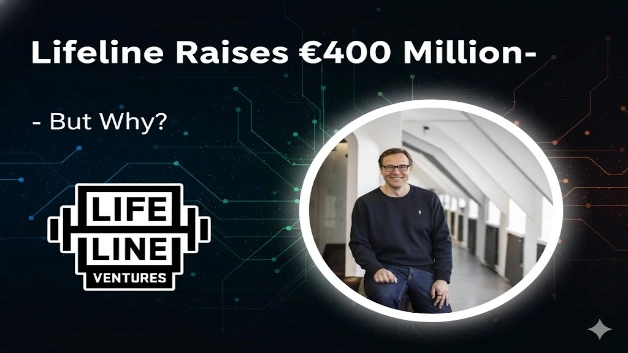Lifeline Ventures, the Helsinki-based venture capital firm that discovered Supercell, Wolt, and Oura before pitch decks existed, has secured €400 million for Fund VI—making it one of Europe’s largest early-stage funds and Finland’s biggest ever. Backed by Grove Street Advisors, Finnish pension giants Varma and Elo, Nordea Bank’s life insurance arm, and government investment unit Tesi, this funding round raises a crucial question: why is nearly half a billion euros flowing into a Nordic early-stage fund when Europe’s late-stage funding remains depressed and founders increasingly relocate to Silicon Valley?
The €2 Billion Ecosystem Nobody Predicted
The answer lies in understanding what’s happening beneath the surface of Finland’s startup transformation. When Lifeline Ventures launched in 2009, Finnish startups raised just over €100 million annually. By 2025, that figure exceeds €2 billion—a 20X increase in 15 years. More remarkably, Finland now produces two to three unicorns annually, while the founder talent pool has expanded fivefold with nearly 40,000 people working in venture-backed tech companies.
Lifeline Ventures invests from day zero—often before pitch decks or products exist—and maintains capital reserves enabling follow-on investments through later rounds. Founded by Timo Ahopelto and Petteri Koponen, the firm’s mission centers on identifying resilient founders at inception and supporting them to global scale. This approach has delivered top-quartile returns, with Lifeline serving as first investor in every Finnish seed-funded unicorn including gaming giant Supercell (Tencent acquired majority stake for $8.6 billion), food delivery leader Wolt (DoorDash bought for $8.1 billion), wearables pioneer Oura (valued at $11 billion), and satellite imaging company ICEYE.
Why European LPs Are Doubling Down on Early-Stage
Lifeline’s €400 million Fund VI trajectory provides context for institutional capital allocation shifts. While Europe’s overall startup funding reached $51 billion in 2024—down 5% year-over-year and 44% below the 2021 peak of $117 billion—early-stage resilience tells a different story. Seed and early-stage funding maintained 60%+ of peak levels, while late-stage collapsed to just 31% of historical highs.
The funding round’s LP composition signals confidence in venture’s early-stage thesis. Finnish pension funds Varma and Elo—representing retirement capital for millions—view early-stage technology as compelling diversification despite market volatility. Government investor Tesi’s participation validates strategic importance of supporting domestic innovation ecosystems. International heavyweight Grove Street Advisors’ involvement demonstrates global recognition that Nordic early-stage opportunities compete favorably against Silicon Valley seed deals.
The Scaleup Crisis That €400 Million Addresses
Europe’s tech ecosystem confronts persistent scaling barriers despite producing innovative founders. Fragmented markets create complexity where U.S. startups achieve continental scale immediately, while European companies navigate 27 regulatory regimes. Late-stage funding scarcity forces many successful startups relocating headquarters to access growth capital—a phenomenon skewing funding statistics favoring North America.
Lifeline’s model counters this dynamic by reserving capital for follow-on investments, enabling portfolio companies scaling without foreign relocation requirements. Partner Timo Ahopelto explains: “From Oura to Wolt to Supercell, Europe has proven it can build companies that matter globally. What’s changing now is that, together with our Limited Partners, we can support founders from their very first steps all the way to global scale.”
Recent investments validate this approach: pre-seed funding for Kova Labs and seed rounds for companies including Illutherm, Arctic Instruments, Bought, Vaire, Soldera, Louhe, Nordcraft, In Parallel, and HyCom Core. These reflect Lifeline’s sector-agnostic strategy spanning climate tech, AI, biotech, and deep tech—sectors attracting 40% of Europe’s $400 billion venture dry powder.
Why This Matters For European Venture Capital
Lifeline’s €400 million raise positions the firm within broader 2025 European venture dynamics where early-stage funds demonstrate resilience:
Early-Stage Outperformance: Europe attracted $5.4 billion across 280+ early-stage deals in Q1 2025, while seed funding totaled $1.6 billion across 850 rounds. Early-stage now represents 60% of quarterly European funding as late-stage activity contracts, with investors prioritizing companies achieving product-market fit over speculative late-stage bets.
Geographic Diversification Accelerating: While London remains Europe’s dominant tech hub with $100+ billion raised 2015-2024, cities like Berlin ($42 billion), Paris, Stockholm, and Munich demonstrate 10X+ funding growth this decade. Smaller ecosystems including Estonia, Poland, and Central/Eastern Europe produce unicorns at accelerating rates—57 CEE unicorns total with 80% receiving VC backing.
Nordic Model Emerging: Finland exemplifies how smaller ecosystems consistently produce global leaders through coordinated LP support, government backing, and experienced GPs recycling capital. Ahopelto notes: “Finland has shown that even a small ecosystem can consistently produce global leaders. Fund VI reflects a maturing ecosystem that’s ready to compete and win on the world stage.”
The Answer: Proven Returns Meet Structural Advantages
So why €400 million for Lifeline? Because the firm combines elements institutional investors value: documented top-quartile returns across 150+ investments spanning 15 years, proven ability identifying unicorns pre-product (Oura invested “pre-PowerPoint”), and structural positioning within Europe’s most resilient venture segment where early-stage funding weathered 2022-2024 downturn better than late-stage.
The fund’s scale—among only a handful of €400 million+ early-stage vehicles in Europe—enables Lifeline competing with U.S. mega-funds for follow-on rounds without forcing portfolio companies relocating for capital access. As European venture capital market projects growth from $75.71 billion in 2025 to $143.31 billion by 2030 at 13.61% CAGR, early-stage represents the most attractive risk-adjusted opportunity.
I’m Araib Khan, an author at Startups Union, where I share insights on entrepreneurship, innovation, and business growth. This role helps me enhance my credibility, connect with professionals, and contribute to impactful ideas within the global startup ecosystem.

Your point of view caught my eye and was very interesting. Thanks. I have a question for you.
Thank you for your sharing. I am worried that I lack creative ideas. It is your article that makes me full of hope. Thank you. But, I have a question, can you help me?